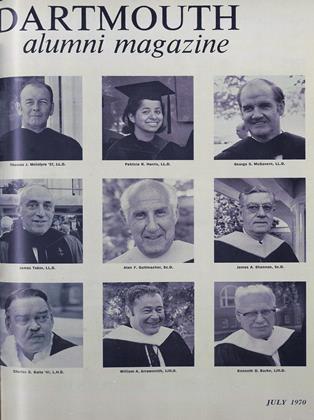THIS moment is very new to me, and yet it has the feeling of a very old experience. It is that experience you go through at the end of every course you teach when the bell will ring within ten minutes, signaling the end of the course, and you have ten minutes to try to teach the students everything that they have failed to learn in the entire course.
I am not going to attempt in the next ten minutes to make up for all the deficiencies of the education you had at Dartmouth. I am going to be selective about this. I am going to try to continue briefly the discussions you and I have had these past weeks on two topics one is Dartmouth and the other is the Nation.
Today we are able to have the Commencement exercise as a united community because we have shared an experience. As we experienced the intoxicating feeling of a large and highly diverse community with a very close feeling of joint work, joint debate, joint action, we realized that a major fraction of the Dartmouth family was away from this campus. I remember saying that I wished I could visit every alumnus of this campus in the month of May. You must have shared the same feeling, because you reached out - much more effectively than I could have alone - to try to close the generation gap between the alumni and the students of this institution. You may have had a feeling of awe, a feeling of worry, a feeling of uncertainty; you had no idea what they, the alumni, were like. Gentlemen, you are now they.
But you are a very special segment of the alumni body of this institution, because you are the only ones who shared the experience that we had together. You can build a natural bridge to bring understanding of this campus to all alumni for what happened here. At the same time I hope that you who have very strong feelings about the rejuvenated Dartmouth will take your opportunities as alumni - not take the easy road out, not drop out, and not forget about your institution - but continue to put pressure on us to make sure that pledges that have been made will indeed be fulfilled.
I will always have a special feeling for the Class of 1970 both because of shared experience and because you are the first class whose diplomas I signed. In effect, I hope that you will serve as special ambassadors, as missionaries who can tie together the entire Dartmouth community in that spirit which we hope will be true of the Dartmouth of today.
I would, secondly, like to talk to you about the Nation. Allow me one brief personal comment. As someone who once had to flee from persecution and war to come to this nation, deep down it is very difficult for me to look at it in any other way but the Land of Promise. Unfortunately, in many important ways, today that promise is unfulfilled. I see deep down everything that this nation needs for greatness, everything that it needs to fulfill that promise. And yet your generation rightly shows us that the heritage we leave you is one of war, poverty, pollution, overpopulation, intolerance of dissent, and that most un-understandable of human failings, racial prejudice.
You tend to see the worst in this nation and you tend not to see the best. But, perhaps, it is good for this nation that we do have a generation that is willing to look at it honestly, that is willing to criticize it, that is willing to call for a greater future.
This spring you made a pledge, not in words but by your actions. You have said that you will try once more to make the system of democracy in America work. I believe that your generation can do this because you must do it. I hope that in the process you are not going to lose hope, because if you lose hope and you give up, you are going to make mockery of that joint experience we shared this spring. Civilization needs the dedication and the convictions which you share at this moment. You must not lose those and you must not against any odds lose that hope which alone can save us.
Men of Dartmouth, all mankind is your brother and you are your brother's keeper.
 View Full Issue
View Full Issue
More From This Issue
-
 Feature
FeatureHYBRIS AND SOPHROSYNE
July 1970 By WILLIAM AYRES ARROW SMITH, LITT.D. '70 -
 Feature
FeatureDartmouth Undying
July 1970 By SHERMAN ADAMS '20 -
 Feature
FeatureDero A. Saunders '35 Elected President of Alumni Council
July 1970 -
 Feature
FeatureHONORARY DEGREE CITATIONS
July 1970 -
 Feature
FeatureReunions, 1970 Style
July 1970 By JAMES L. FARLEY '42 -
 Feature
FeatureFour Alumni Awards
July 1970
John G. Kemeny
-
 Article
ArticlePresident Kemeny to President Nixon...
NOVEMBER 1970 By John G. Kemeny -
 Feature
FeatureValedictory to 1971
JULY 1971 By John G. Kemeny -
 Article
ArticleI was enormously moved
April 1979 By John G. Kemeny -
 Feature
FeatureAn extremely small malfunction ... and then something terrible happened
December 1979 By John G. Kemeny -
 Cover Story
Cover StoryThe Ten-Year Report By the Thirteenth President
June 1980 By John G. Kemeny -
 Article
ArticleA Compressed Life
February 1993 By John G. Kemeny
Features
-
 Feature
FeatureThird Century Fund Leaders ...
OCTOBER 1967 -
 Features
FeaturesA Wild Idea
NOVEMBER | DECEMBER 2022 -
 Feature
FeatureMcLaughry Closes 14-Year Regime As Dartmouth's Head Football Coach
January 1955 By CLIFF JORDAN '45 -
 Feature
FeatureWhen Tanzi's Closed
MARCH 1991 By Everett Wood '38 -
 Features
Features“A Fierce Advocate”
MAY | JUNE 2025 By GRACE BROWNE -
 Feature
FeatureThe New England Review and Bread Loaf Quarterly
NOVEMBER 1986 By Peter Mandel

